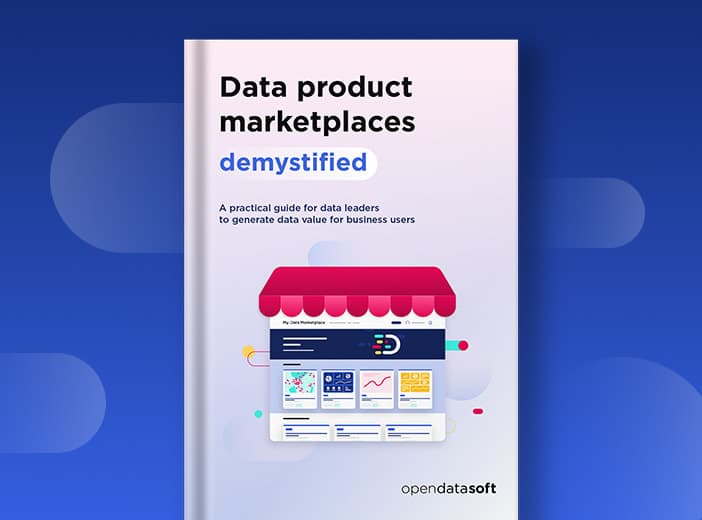Opendatasoft harnesses agentic AI to connect AI models to real-world data, driving greater business impact
What is agentic AI and how does it help increase data consumption? Our Q&A blog explains the current state of AI, and how Opendatasoft is innovating to drive forward its impact for customers.

While artificial intelligence (AI) promises enormous benefits, it requires access to reliable, high-quality data to deliver real ROI and innovation. Providing this in the right format is vital to both powering Large Language Models (LLMs) and fast-emerging AI agents (also known as agentic AI).
To better understand the current impact of AI on data management and consumption – and how Opendatasoft is leading the way in applying AI to real-world problems, we spoke to CTO and co-founder David Thoumas for the latest updates.
Where are we now when it comes to the business deployment of AI?
“The application of AI is already disrupting business and wider society. However, traditional LLMs tend to be trained to automate and complete general tasks, and lack the context required to complete specific roles. This limits their real-world uses. If the task changes, they require retraining – they are unable to automatically adapt or tackle broader roles.
AI also requires access to high-quality, reliable data. However, many organizations are discovering they don’t have these foundations in place, hampering their AI use. All these factors are leading to frustration with many AI deployments and a failure to deliver promised ROI.
The positive news is that this picture is now changing with new advances in agentic AI emerging that connect AI with the real-world.”
What is agentic AI?
“Agentic AI (or AI agents) are AI systems designed to act independently, making decisions and taking actions to achieve set objectives with minimal human intervention. They can handle complex, multi-step problems and adapt to changing environments by learning from experience.
Essentially, they bring AI to the real-world, both physical and digital, performing human tasks and offering an infinite number of possibilities for using AI. How it works is that the user will be able to design an agent to carry out a task, a process, a search, etc, based on an AI model, and linking to applications. This represents a revolution in the way AIs operate, moving from content generation to taking concrete actions in business environments.”
How does agentic AI provide a new channel for business users to explore data?
“Just as for LLMs, AI agents require automated access to data and applications, and achieving this can be complex in a fast-moving market. To overcome this challenge, AI company Anthropic has introduced the Model Context Protocol (MCP), a new open-source standard for connecting AI models to existing data systems, while facilitating their integration into various professional environments. MCP provides an interface between agents and services, standardizing how services and LLMs communicate. A good way to think of it is like an API that allows anyone to build smart agents based on data.”
What is Opendatasoft announcing around MCP?
“We already know a huge amount about API-fying data on our platform. We’ve used this experience to launch a turnkey service that feeds AI agents with data from our data product marketplace via our new MCP server, while retrieving analytics and user feedback. This enables agents to interact easily with the high-quality, structured data on Opendatasoft data marketplaces via function calls.”
Why is this a game changer for data democratization?
“Organizations are ready to embrace AI as a way to augment human capabilities and increase data democratization. With our new MCP server, operational data will feed into AI agents and business users will find it easier to interact with data to transform how they work. This paves the way for true interaction between intelligent agents and operational data, unlocking the benefits and value of data at scale.
As a best-of-breed data product marketplace, we are adopting an agnostic, unifying approach. Whereas other players bring operational data back into their platforms, our technology references assets in a unified catalog, irrespective of where it is stored. We’ve also seen the benefits of our intuitive user interface – by designing a marketplace for humans, it makes its use by AI much easier.”
How is agentic AI being used by Opendatasoft, now and in the future?
“We have looked hard at the different needs of users, administrators and data product owners when introducing our MCP server. Initially our MCP server exposes four functions from Opendatasoft’s Explore API v2.1. This allows agents to access API documentation, search for datasets using keyword or semantic search, filter or aggregate the data they include, and export them. Moving forward, we will expose more of our admin features via MCP, so agents will know how to set up a portal. Allowing an agent to perform actions and automate administration and data management tasks.
We’ve extensively tested our MCP server with desktop apps like Anthropic’s Claude Desktop, as well as other MCP-compliant apps such as OpenAI’s ChatGPT and Microsoft Copilot and are really pleased with the results. By using the MCP standard the aim is to give customers choice – they can deploy their preferred agent or app, as long as it complies with MCP.
The user experience takes place directly within the AI agent application, not on the customer’s data marketplace, providing a new channel for clients to share their real world data and therefore unlock greater business performance. It will help make agentic AI much more powerful as agents will be connected to real data.”
How does Opendatasoft differentiate itself from other players when it comes to agentic AI?
“I’ve already mentioned that our approach of describing data in human-readable ways is the best way to communicate with both people and LLMs, which makes it simpler for our clients to roll-out AI based on robust data foundations. Two other factors also differentiate us. Even though data from our marketplaces is consumed within agents and LLMs, rather than the platform itself, it passes through our MCP server, meaning we can track and analyze it. So we can see which is the most used (and useful) data for agents and humans, as well as improving data quality. We also provide access to around 50,000 datasets from across the globe. In a world where advancing AI depends on data availability, providing a central access point to this depth and breadth of freely available data is a key benefit for our clients.”
What are the benefits that agentic AI brings?
“As with all our innovations, the introduction of our MCP server is based on concrete requirements from our customers and is designed to support them in democratizing data and reducing management overheads. By enabling organizations to create their own AI agents, driven by our data, they can save time, increase productivity, and better leverage their data. Agents can automatically search and act on data, creating visualizations or driving new processes and workflows, backed by a full audit trail and explainability of AI decisions. For example, many organizations struggle to standardize and apply metadata to all their data assets. Agentic AI can help create, complete, or enrich existing descriptions, potentially automating tasks such as generating dataset descriptions, making it easier to navigate and manage data.”
Where are you now on your journey with AI? What are the next steps?
“We’re focused on the key objective of helping our clients increase data consumption and have been investing heavily in AI to support that goal. In December 2023, we launched vector AI search across our clients’ data marketplaces to improve data discovery by making it intuitive for data consumers to search and find data. In 2024 we enabled users to automatically create visualizations, maps, and dynamic tables through text prompts via the interface, with generative AI helping to increase the availability of insights from an organization’s data. All of these features are available through either OpenAI or MistralAI’s models, giving clients choice – and we aim to extend this to more models in the future.
Our MCP server is the next step in our AI strategy as it opens up the whole field of agentic AI. We’re working to deploy AI agents to help improve and enrich data, standardize metadata, generate content, and track user feedback and usage, as well as creating chatbots that work directly on our data marketplace. All of these innovations are designed to meet customer needs, and we’re working closely with them to test and roll out AI that improves their lives and turns their data into value. Watch this space for more announcements!”




